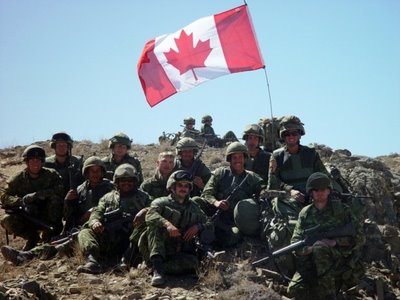
From Stephen Saideman: I think Canada made a difference while it was there, improving conditions in Kandahar even if the quarterly reports might over-state the gains. Infant mortality is down, the percentage of women dying while giving birth is down, polio vaccinations have been taking place, the marketplaces are apparently doing pretty well, and the Afghans are more secure than they used to be. Canada did help to prevent Kandahar and the nearby provinces from falling to the Taliban–that is not a small feat, but a significant contribution. Some will say that not losing is not winning, but given the situation, the limited assets for a large hunk of land, it is a meaningful contribution. There were no big massacres of civilians in Kandahar by the Taliban (lots of small scale violence but no mass killings a la Srebrenica [see below]). Canada defended Kandahar quite well, even if it did not possess the means to take control of the province. . . .
It comes down to this: militaries are instruments of policy. Using these instruments can be costly. This instrument can be used to make a country more relevant and influential than it would otherwise be. Did Canada have more influence because of its Kandahar effort? Absolutely. The big question (that Phil of the video link above always asks me) is whether this influence existed outside of Afghanistan. First, let me backtrack a bit: Canada has often been in places where it has had little influence over what it is doing. So, it is significant that Canada had influence over stuff within Afghanistan because that is quite distinct from previous UN/NATO efforts. Canada had leadership positions within NATO, it rotated command over a key sector (Regional Command south), it had major positions within the UN in Kabul, and so forth. So, yes, Canada had significant influence in the theatre.
But, of course, one could ponder whether Canada gained anything beyond Afghanistan. I think so, but the evidence is less clear. One way to consider this is to consider the demise of Germany. By being caveated in Afghanistan, Germany has lost influence within NATO on other issues. This could have been Canada’s fate. In my interviews at NATO HQ, I was told (and yes, we cannot buy into everything folks say there) that Canada had influence on other aspects of NATO than the Afghanistan mission precisely because it made a contribution in Afghanistan. That Canada shaped the new Strategic Concept that is supposed to shape the organization down the road. A different piece of evidence is that the Canadian three-star general became the natural choice for commanding the Libyan effort because of Canada’s performance in Afghanistan. There was no way that an Italian or Spaniard or other NATO country that was heavily caveated in Afghanistan would be given this major position. . . .
Canada cannot be everywhere, nor should it try. Canadian soldiers and civilians extended a tremendous amount of effort at great cost to themselves and their families. Was it worth it? Yes, it was. The effort both made things better for the Afghans in the short term and increased Canada’s influence in the world. If you believe that Canada has good intentions and good values, a more important Canada is a good thing. Despite my grumbling about Canada [too much hockey 😉 ], I think that more Canada is, indeed, a good thing.
Stephen Saideman is a professor of political science at McGill University. (photo: Surghar Daily)
Image: surgar%20net%207%206%2011%20Canada%20Afghanistan.jpg
